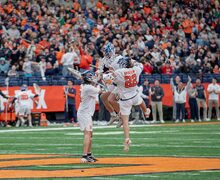UN alumnus argues for reform
Following a reminder by Dean Mitch Wallerstein to keep the Maxwell School of Citizenship and Public Affair’s long commitment to welcoming diverse viewpoints in mind, former U.S. Ambassador to the United Nations John Bolton took the podium to a long and sturdy applause from an overflowing Maxwell Auditorium.
Bolton’s speech Friday at 10:15 a.m. was titled ‘U.N. Reform and U.S. Priorities.’ Maxwell professor Catherine Bertini was influential in securing Bolton’s visit and introduced her long-time friend; she said the two had been friends since their early Washington, D.C., days when they were out to change the world.
‘He listens with as much intensity as he speaks,’ Bertini said just before she gave Bolton the floor.
Bolton had been a UN ambassador until December, when he resigned chiefly because senators on the Senate Foreign Relations Committee were obstructing his confirmation and preventing a vote on the floor of the Senate.
His speech addressed three major points: the complications with reforming the UN Security Council (especially adding new permanent members), program failures under former UN Secretary-General Kofi Anon and management reforms he said he thinks are vital to the future of the UN.
Bolton, sporting his trademark white mustache and oval glasses, lived up to his reputation as a blunt speaker when he warmed up the crowd with a joke, at the expense of France.
He then dove into the history of the Security Council and explained that of the five nations with permanent seats, only the United States reflects the nation it was at the end of World War II. Russia and China were run by different governments when they were given permanent seats, while France and Great Britain no longer possess global empires.
‘If you were doing this over, you’d only have one permanent member,’ Bolton said referring to the United States.
Bolton argued that Japan has the only legitimate claim to a permanent seat, before walking the audience through the complications he sees with reforming the Security Council.
The issues he discussed range from countries trying to prevent U.S. allies from gaining seats to the African nations demanding a permanent rotating seat to the conflict that would arise if Portuguese-speaking Brazil represented Latin America. Bolton said that with so many different visions for reform, all have failed and he advocates a trial-run of a ‘Japan only’ plan.
‘They will see trying to change everything at once is bound to fail,’ Bolton said.
Evolving the UN into a more efficient body anchored the remainder of Bolton’s speech.
‘The UN carries a lot of bureaucratic baggage,’ Bolton said.
Bolton argued that the UN should change its funding system into one based on voluntary, per-program financing. He believes this will make countries look more closely at a program’s effectiveness, before deciding to fund it. Currently the United States, Germany and Japan provide the most UN funding, yet still only control one vote in the general assembly.
‘It’s fun to spend other people’s money,’ Bolton said of the other 189 member nations.
Bolton finally addressed his vision for the United States’ relationship with the UN, when he said: ‘The UN can be an effective instrument of U.S. policy, but if it doesn’t work our obligation is to say ‘can we fix it or are there alternatives?”
Bertini said she thought his role as a global newsmaker made him a valuable speaker.
‘He is so articulate. He expresses his views so well,’ said Bertini evaluating Bolton’s
speech.
The only fireworks of the day came during the audience question portion of the talk.
Synthia Banas, a 1969 alumna of the SU School of Library Sciences graduate program, brought up Iraq, its only mention during the 90-minute lecture, and told the former ambassador that United States needs to listen to other nations. Banas had called out during an early part of the address, but Bolton calmly told her she would have her chance to speak during the Q & A.
‘We attacked Iraq, they never attacked us,’ Banas said in an interview. ‘What are these kids over there for?’
‘I thought he was the most effective when he answered the first question,’ Bertini said regarding the exchange between Bolton and Banas. ‘He did it very forcefully and a lot of people applauded.’
Another audience member read a clip from the New York Review of Books that was critical of Bolton’s tenure and denounced his unsympathetic attitude towards the UN. The man wanted Bolton to respond to the criticism.
Bolton replied, ‘You’ve now got a laboratory experiment because I’m not at the UN anymore. So ask yourself in two years if sweetness and light has broken out because I’m no longer there.’
The audience broke into laughter with his reply.
After his address Bolton met with the various print and broadcast outlets from the Syracuse area and took broad questions on UN reform and other international affairs concerns, primarily the United State’s policy towards Iran. He then held an open-table discussion with students and faculty during a lunch hosted by Wallerstein.
The event was streamed live on the Maxwell School’s Web site and is archived in the Speakers Online section.
The reaction from the community was all positive, according to Bertini.
‘I got a lot of e-mails and talked to a lot of people, afterwards. And they were really pleased,’ she said.
Published on February 3, 2007 at 12:00 pm





